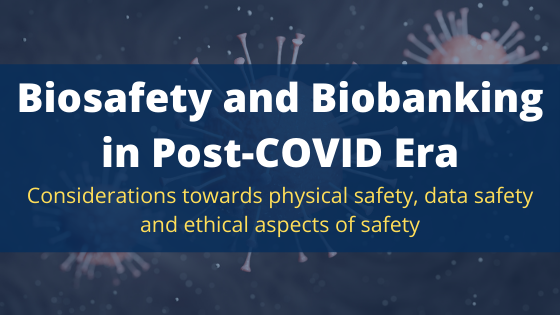The COVID19 pandemic caused havoc worldwide. The spread of the disease was fast, and the medical community did not have answers to many questions posed by the disease. Researchers needed biospecimens to conduct various experiments to answer these questions.

The pandemic highlighted the importance of quality annotated biospecimens for research, and biobanks can play a crucial role in providing those. However, handling such potentially infectious biospecimens can create a safety risk. This article focuses on the safety-related aspects in the post-COVID era. It includes three major parts:
- Physical Safety
- Data Safety
- Ethical Aspects Related to Safety
Physical Safety
Physical safety includes – the safety of the biospecimens and the laboratory personnel who process them.
The safety of biospecimens is directly related to the quality of specimens. The concept of biospecimen safety extends beyond the immediate collection and handling of biospecimens and onto the long-term storage conditions. To ensure the safety of biospecimens, it is essential to implement appropriate protocols, which include different steps. The first step is to define the type of biobank and establish the collection methods based on that. The guidelines and best practices created through established agencies and biobank networks (e.g., NCI, IARC, ISBER) enable smaller structures to have available information and safely build their system.
Further, technological innovations can help strengthen the safety protocols, e.g., automated specimen processing equipment, automated freezers, etc. will reduce the errors due to manual processing and exposure to pathogenic microorganisms.
The well-being of biobank staff can be achieved by consistent training and providing customized informational guides for them. For example, a ‘Newcomer starter pack’ can be given to new staff members to understand the safety guidelines, especially in the case of highly pathogenic microorganisms.
Data Safety
Biobanks need to focus on data protection. Establishing an appropriate legal framework of operations is the first step in ensuring data safety. In Europe, the General Data Protection Regulation (GDPR) provides a framework for biobanks to facilitate information transfer. The consensus is that for any transfer of data; three elements are required:
- Establishing informed consent
- The material/data transfer agreements
- A code of conduct
However, the concept of safe data handling goes beyond GDPR. It includes additional aspects, such as data integrity, the appropriate handling of data, installing security measures, and staff training. It is also important to take essential steps to avoid cyberattacks such as malware attacks and Distributed Denial-of-Service (DDoS) attacks.
Ethical Aspects Related to Safety
Ethical issues are commonly present in many aspects of biobanking. The fact that biobanks deal with human samples, invading an individual autonomy or limiting self-control provokes several ethical issues. Hence, biobanks need to consider the ethical aspects of safety.
The UK Biobank succeeded in building trust in the population by following precise and transparent ethical approaches and utilizing citizenship language.
Ethical and legal regulations permanently evolve in healthcare, reflecting the advancement in infrastructure, processing methodologies, or the depth of collected data. The infrastructure-related legal requirements can often be resolved at the technical/engineering level. The legal definitions of consent vary widely between countries, as does the implementation. For example, the specific consent process is required in Zambia and Tanzania, while the more permissive broad consent is implemented in Thailand and Nigeria. Hence there is a need for a consistent purpose and application of informed consent. The new version of the ethics guidelines should guarantee the patient’s safety and personal information.
The current safety-related aspects of a biobank are addressed by the –
- ISO 20387(2018): general requirements for biobanking
- ISBER Best Practices
- ASCP/ISBER international training qualification in biorepository science examination for biobank technicians
However, research needs to address biobank safety in the post-COVID era.
Reference: https://www.sciencedirect.com/science/article/pii/S259005362100063X